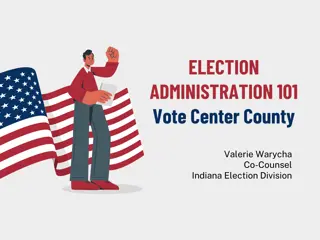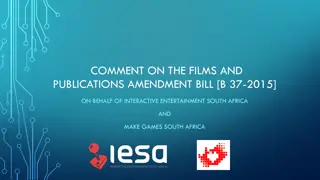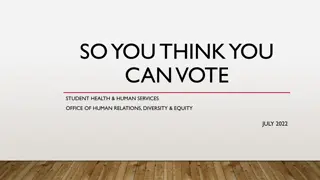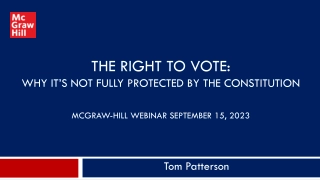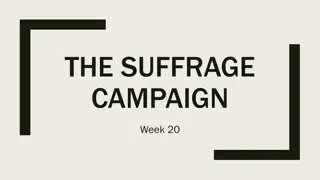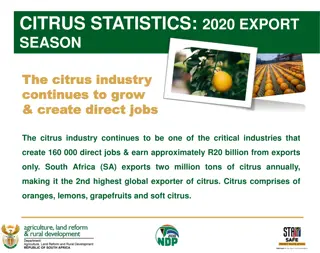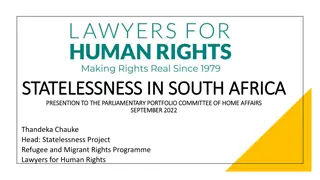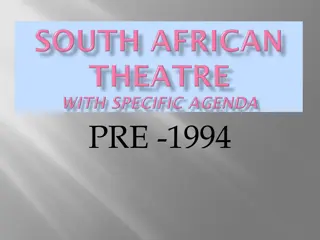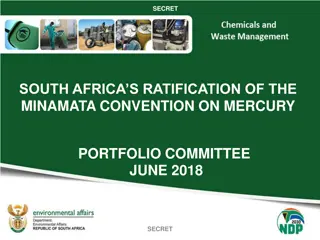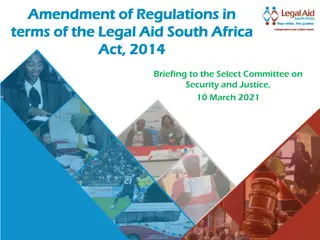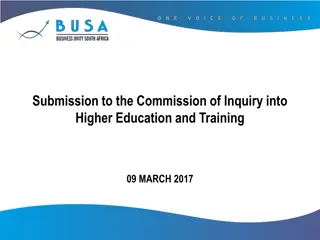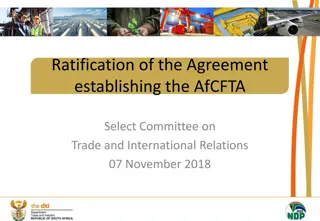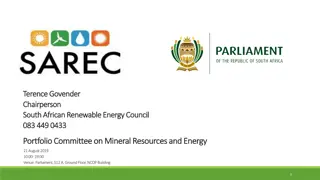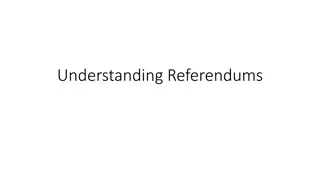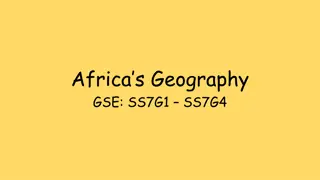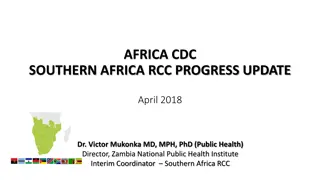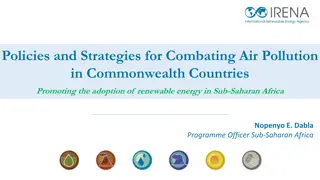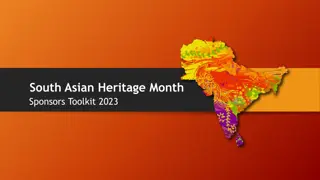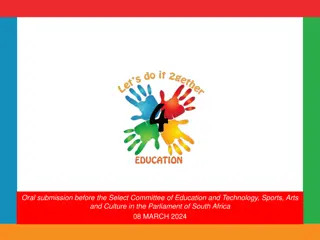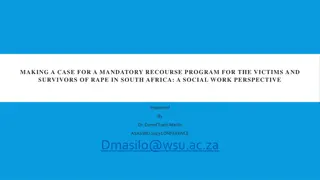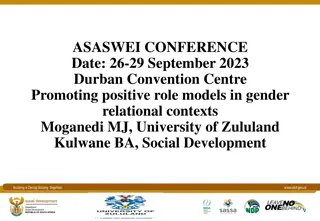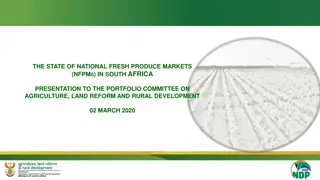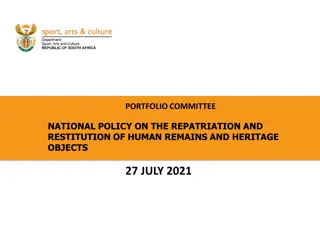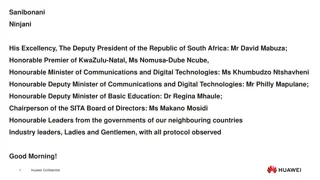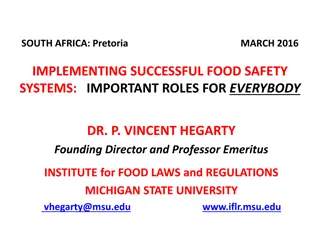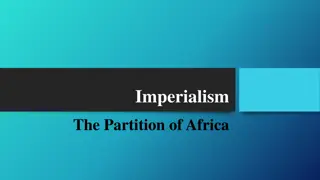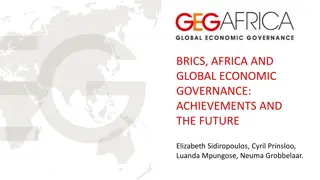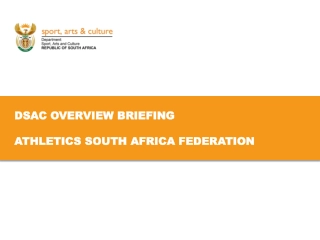Importance of the Right to Vote in South Africa
The Constitution of South Africa underscores the significance of the right to vote, reflecting values of democracy, equality, and citizenship. Various court cases affirm that voting is not only a symbol but a crucial part of democracy, strengthening civic responsibilities and accountability in the country.
Download Presentation

Please find below an Image/Link to download the presentation.
The content on the website is provided AS IS for your information and personal use only. It may not be sold, licensed, or shared on other websites without obtaining consent from the author. Download presentation by click this link. If you encounter any issues during the download, it is possible that the publisher has removed the file from their server.
E N D
Presentation Transcript
PRIVATE MEMBERS BILL ELECTORAL ACT
CONSTITUTION OF SOUTH AFRICA Section 1(d) of the Constitution provides: The Republic of South Africa is one, sovereign, democratic state founded on the following values: . . . . (d) Universal adult suffrage, a national common voters roll, regular elections and a multi-party system of democratic government, to ensure accountability, responsiveness and openness.
Section 9(1) of the Constitution provides: Everyone is equal before the law and has the right to equal protection and benefit of the law . Section 19(3)(a) of the Constitution provides: Every adult citizen has the right To vote in elections for any legislative body established in terms of the Constitution, and to do so in secret .
The importance of the right to vote has been emphasised by the Constitutional Court, per Sachs J, in, inter alia, August and Another v Electoral Commission and Others 1999 (3) SA 1 (CC) ( August ) at paragraph 17: Universal adult suffrage on a common voters' roll is one of the foundational values of our entire constitutional order. The achievement of the franchise has historically been important both for the acquisition of the rights of full and effective citizenship by all South Africans regardless of race, and for the accomplishment of an all-embracing nationhood. The universality of the franchise is important not only for nationhood and democracy. The vote of each and every citizen is a badge of dignity and of personhood. Quite literally, it says that everybody counts. In a country of great disparities of wealth and power it declares that whoever we are, whether rich or poor, exalted or disgraced, we all belong to the same democratic South African nation; that our destinies are intertwined in a single interactive polity. Rights may not be limited without justification and legislation dealing with the franchise must be interpreted in favour of enfranchisement rather than disenfranchisement.
In Richter at paragraph 53, the Constitutional Court, per O Regan J, held: In entrenching the right of every citizen to vote, s 19 of our Constitution affirms that symbolic value. But the right to vote, and its exercise, has a constitutional importance in addition to this symbolic value. The right to vote, and the exercise of it, is a crucial working part of our democracy. Without voters who want to vote, who will take the trouble to register, and to stand in queues, as millions patiently and unforgettably did in April 1994, democracy itself will be imperilled. Each vote strengthens and invigorates our democracy. In marking their ballots, citizens remind those elected that their position is based on the will of the people and will remain subject to that will. The moment of voting reminds us that both electors and the elected bear civic responsibilities arising out of our democratic Constitution and its values. We should accordingly approach any case concerning the right to vote mindful of the bright, symbolic value of the right to vote as well as the deep, democratic value that lies in a citizenry conscious of its civic responsibilities and willing to take the trouble that exercising the right to vote entails.
OBJECTIVES OF THE BILL With the right to vote forming the foundation for all democratic political process in South Africa, it is imperative that registration and voting mechanisms be as broad and inclusive as possible. Currently, however, the mechanisms in place for overseas based voters are falling short of this standard. The Draft Bill will provide for: 1. All South African citizens to be permitted to register to vote on production of a valid ID document only. 2. The day designated for overseas casting of votes to necessarily fall on a weekend. 3. South Africans overseas be permitted to vote for the Provincial Legislatures 4. Voting stations overseas to not be limited to consulates, embassies or high commissions, allowing for more remote voters to be able to vote without travelling great distances. 5. Vote counting procedures to properly account for differences in time zones when considering deadlines.
1. All South African citizens to be permitted to register to vote on production of a valid ID document only. Currently South Africans registering abroad have to produce both an ID and a passport while registering this is discriminatory and goes against the spirit of the Constitution.
QUESTION FOR WRITTEN REPLY QUESTION NO. 304 DATE OF PUBLICATION: FRIDAY, 16 FEBRUARY 2018 INTERNAL QUESTION PAPER 2 OF 2018 304. Mr M Waters (DA) to ask the Minister of Home Affairs: Does she intend to amend legislation to allow South Africans living abroad to produce only one official document when voting; if not, (a) why not and (b) is it not discriminatory against those South Africans living abroad to have to provide two official documents when South Africans voting at home only have to produce an identity document; if so, when will these amendments be tabled? NW326E REPLY: Ahead of the 2019 national and provincial elections, the intention of the Electoral Commission is to amend section 11(1) of the Election Regulations, 2004, such that South African citizens who intend to apply to vote abroad will not be required to produce a passport, but will be required to produce an identity document or smart identity card indicating citizenship of the Republic of South Africa. The proposal to amend electoral legislation falls within the statutory jurisdiction of the Electoral Commission.
2 The day designated for overseas casting of votes to necessarily fall on a weekend. Currently South Africans abroad vote on a weekday which is not a public hoilday (unlike in South Africa) in their respective countries. This discriminates against voters as they have to take at least one days leave in order to vote.
3 South Africans overseas be permitted to vote for the Provincial Legislatures Every adult citizen has the right To vote in elections for any legislative body established in terms of the Constitution, and to do so in secret .
1777. Mr M Waters (DA) to ask the Minister of Home Affairs: (1) and/or working abroad have been able to cast their ballots for both the national and provincial elections since 1994; if not, (i) on what date did the issuing of the national and provincial ballots change, (ii) what was the reason for the change and (iii) what legal provisions informed such a decision; if so, what address was used to determine which provincial ballot was issued to each individual; (2) Whether he has found that the decision is constitutional and does not amount to disenfranchisement? Whether (a) public servants and their families and (b) members of the SA National Defence Force living NW1934E REPLY: In preparation for the National and Provincial Elections of 1999, the Electoral Act 73 of 1998 established limited categories of temporarily absent voters who could vote outside the Republic. One such category was absence from the Republic on government service or membership of the household of the person so being absent. The head office of the government department or entity in the Republic of such a person or members of his household was regarded as the place of ordinary place of residence. This category of voters was issued both a national ballot as well as a provincial ballot. A 2003 amendment to the Electoral Act extended voting abroad to those on temporary absence from the Republic for the purpose of a holiday, business trip, attendance of tertiary institution, educational visit or in an international sports event. In all cases it was required that voter inform the Chief Electoral Officer of their intention to vote abroad. In 2013 the regulatory framework was again amended to extend voting outside the Republic to all eligible South Africans and an international segment of the voters roll was established. All voters outside of the Republic are now treated in the same manner in that only a national ballot is issued for voting outside of the Republic. The initial limitation to the categorisation of voters who qualify to voting abroad was found to be unconstitutional in the Richter Judgment (Richter v The Minister for Home Affairs and Others 2009). For this reason, the legislation was amended to open voting outside of the Republic to all eligible citizens.
Between 1999 and 2013 people voting outside the Republic were issued both a National and Provincial ballot paper. From 2013 overseas voters were disenfranchised of their Provincial Ballot paper. In contravention of the Constitution Section 19 (3) (a) Every adult citizen has the right To vote in elections for any legislative body established in terms of the Constitution, and to do so in secret .
4 Voting stations overseas to not be limited to consulates, embassies or high commissions, allowing for more remote voters to be able to vote without travelling great distances. Currently voting stations are limited to Embassies, Consulates and High Commissions. The consequences of this are -
SAs in the USA Miami, Florida where 10,000 SA s live, have to travel to Washington DC which is 14 h 54 min drive (1 695,7 km) and from Austin, Texas where SA s live, 9,000, have to travel to Chicago which is 16 h 9 min drive (1 813,1 km) CANADA 6000 SA s live in Vancouver and have to travel to Toronto which is 4 173,7km or 40 hours by car.
Australia where South Africans can only vote in Canberra travelling time by car from Brisbane (40 133) 12h24min -1190.1km Perth (41 008) 39h 3 718.3km Sydney (43 059) 3h2min 286km Melbourne (27 188) 6h52min 622.7km Adelaide (6 609) 12h10min 1 159km
New Zealand 30 612 South Africans living in Auckland have to travel 7h35min 646.2km to Wellington UK where the Embassy is located in London travelling time by car is Edinburgh (10 607) 7h19min 657km Newcastle (3000) 5h1min 465.5km Bristol (24 000) 2h41min 192.3km Liverpool (13 000) 4h20min 359.2km
These distances are not only prohibitive to people casting their votes but also in exercising their Constitutional rights.
5 Vote counting procedures to properly account for differences in time zones when considering deadlines. In 2014 General Election votes from CANADA arrived too late, in South Africa, to be counted. The IEC and DIRCO need to ensure that overesase voting occures timiously to ensure ALL ballots are received and counted.


